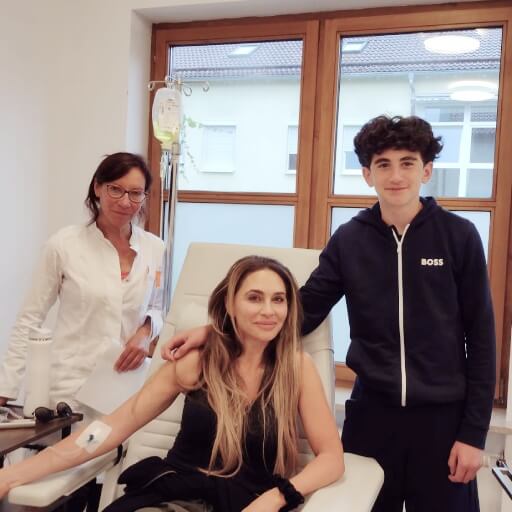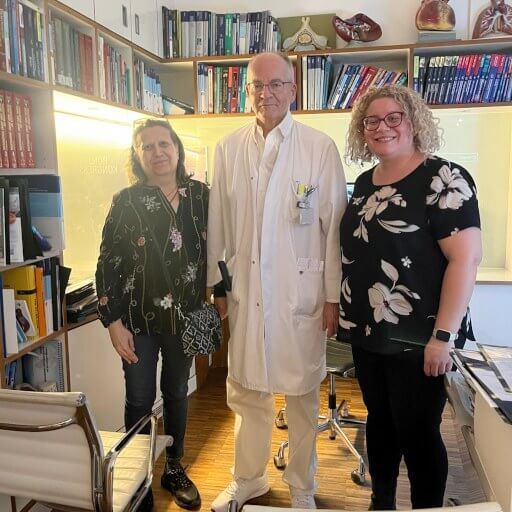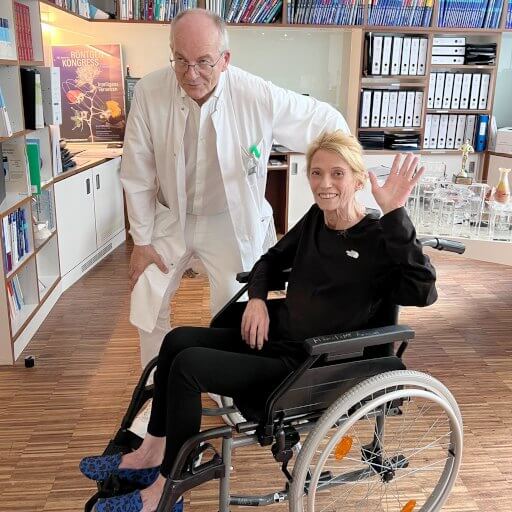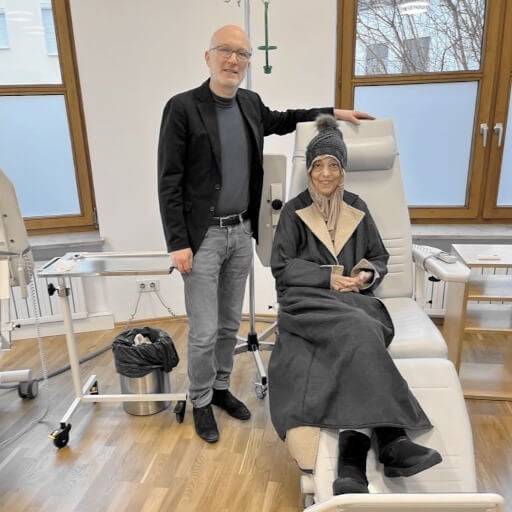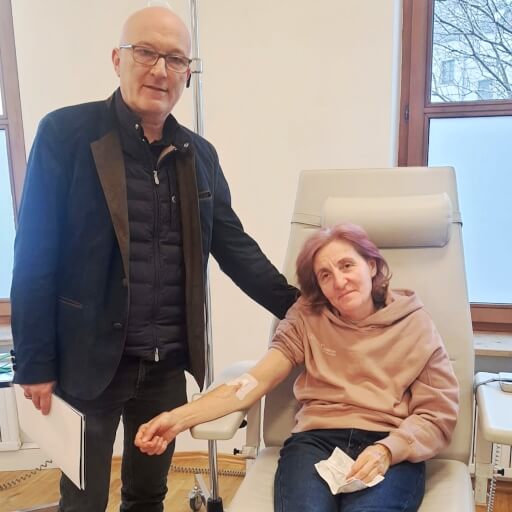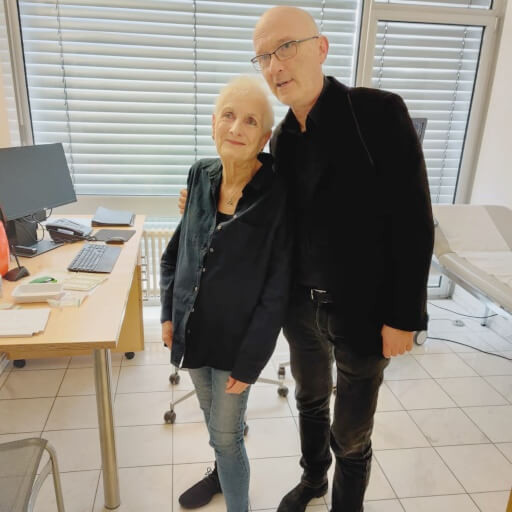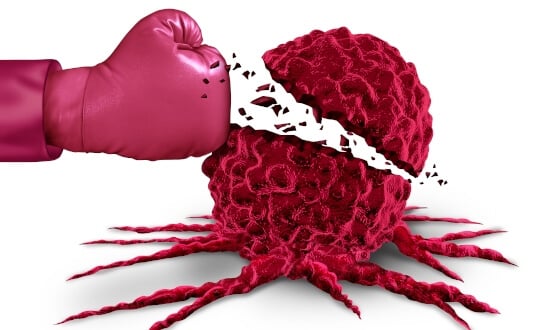Over 2.3 million women were diagnosed with breast cancer in 2020 [1]. Nearly 685,000 died from it that same year [2]. Most of those deaths? Preventable with earlier detection.
The challenge is this: early-stage mammary tumors don't announce themselves. Cancer cells multiply quietly in breast tissue without pain, without obvious warning – making timely detection difficult yet absolutely crucial. When caught early, 5-year survival exceeds 90% [3]. In the disease spread to lymph nodes or distant organs (bones, liver, lungs, brain), treatment becomes exponentially more complex, survival rates drop.
As recognizing symptoms early can literally save your life, we'll outline the most common signs, explain what changes deserve attention, help you understand personal risk. Because early recognition isn't just about better outcomes – it's about survival.
General Symptoms of Mammary Gland Cancer
Malignant growths develop from epithelial cells in breast tissue. Symptoms appear silently at first. Sometimes barely noticeable. As the tumor grows, signs become more evident – especially if women regularly perform self-examinations and attend screenings.
The symptoms of mammary tumors can be grouped into visible changes, palpable signs, and subjective (sensory) symptoms.
Visible Signs to Watch For
Breast shape or size changes. One breast may suddenly appear larger, higher, or deformed. Natural asymmetry is normal, but recent changes need evaluation.
Skin alterations. Dimpling, swelling, thickening – or that distinctive orange-peel texture called peau d'orange. These can be indicative of lymphatic vessels affection with subsequent lymphostasis.
Unexplained and recurrent redness around the areola may be indicative of inflammatory breast cancer. This is a rare but aggressive form that requires immediate attention.
Nipple changes are crucial warning signs. Retraction (pulling inward), rotation, crusting – these suggest involvement of deeper structures. Discharge is another red flag, whether bloody, purulent, or resembling colostrum.
Some mammary tumors ulcerate in late stages. Bleeding or non-healing lesions appear.
Then there's Paget's disease – a rare subtype that shows up as scaly red patches or ulcers on the nipple and areola. Itching, burning, oozing around nipple. Frequently gets misdiagnosed as eczema [4], which is why such symptoms should never be ignored.
Palpable Signs of Mammary Cancer
Palpation often reveals abnormal lumps before visible changes occur—that is why women should regularly check their breasts to detect breast cancer early by recognizing changes like these.
Lumps or nodules are most common signs of mammary cancer in women. Usually hard, irregular, and immobile—though not all lumps are cancerous, any new or persistent lump needs evaluation. Changes in gland mobility are another symptom: the affected breast may move abnormally or appear "fixed" due to tumor attachment to underlying structures.
Some malignant tumors don't form distinct lumps. Instead they spread diffusely, making entire area feel firm and uneven.
Lymph node enlargement may indicate spread even before a breast lump becomes palpable:
- in axillary region (underarm);
- supraclavicular area (above collarbone);
- cervical nodes.
Important point: mammary tumors under 2 cm (T1 per TNM classification) may not produce clear symptoms [5]. But even small tumors can be detected early.
Subjective (Sensory) Symptoms
These symptoms are based on how woman feels. Less specific than visible or palpable signs:
- Itching or burning (in the breast or nipple area).
- Discomfort or tightness – often mistaken for premenstrual symptoms, etc.
- Pain in the breast or underarm. This is characteristic of inflammatory breast cancer or advanced mammary tumors.
- Fever, fatigue, and nausea – intoxication signs, in advanced disease; as obvious, this is non-specific complaint.
Breast cancer symptoms are not always severe or alarming. Up to 10% of cases are detected through imaging without any physical symptoms whatsoever [3, 4].
Why Early Detection Changes Everything
Growth rates vary dramatically among malignant tumors. Some progress slowly over years – others spread aggressively within months, metastasizing to bones, liver, lungs, brain. The earlier cancer cells are detected, the better the chances for breast-conserving surgery and a full recovery. Many women delay seeking care. Fear, misinformation, hoping symptoms will resolve on their own…
The only correct attitude is that we must recognize and act on mammary tumors early. If you notice any changes – even minor ones – you should consult a doctor ASAP.
When It is Better to See a Doctor
One of the most dangerous misconceptions about breast cancer: it causes pain early on. It doesn't. Most early signs are subtle – no discomfort, no obvious alarm bells – which is precisely why waiting for pain before seeking help can lead to delayed diagnosis and more aggressive disease progression that's harder to treat and comes with worse survival outcomes.
Warning signs requiring immediate medical attention include new lumps or hard areas in breast or underarm, nipple changes (retraction, crusting, non-healing rash), unusual nipple discharge especially if bloody or spontaneous, skin changes like dimpling or peau d'orange texture, sudden asymmetry, persistent itching or burning sensation, swollen lymph nodes in armpit or above collarbone, non-healing sore or ulcer on the breast.
These signs may not hurt. That is the problem. They may indicate presence of cancer cells or underlying mammary tumors developing quietly beneath surface. Early-stage cancers are treatable with less invasive methods, better outcomes, higher survival rates – if evaluation is postponed though, tumor growth accelerates, skin becomes involved, malignant cells spread to distant organs.
If you're over 40 and haven't had a clinical breast exam or a mammogram in a year, it's obligatory to schedule a visit. It has been proven that screenings provide best chance to catch breast cancer early.
Being cautious can save your life. If something doesn't seem right – don't wait, get it checked.
Diagnostic Steps After Symptoms Appear
If you or your doctor suspect breast cancer based on symptoms, next step involves diagnostic procedures. These confirm presence of tumor, determine its type, assess progression.
Imaging Tests to Detect Breast Cancer Early
The 1st line of diagnostics includes imaging tools designed to detect structural changes in breast tissue.
Mammography is gold standard. It identifies mammary tumors as small as a few millimeters—even before symptoms appear, even before you can feel anything yourself [1]. Women over 40 should undergo routine mammograms once every 1-2 years; though your doctor may recommend more frequent screening based on family history or other risk factors.
Ultrasound works in combination with mammography. It easily differentiates between solid malignant tumors and fluid-filled cysts (an important distinction that mammography alone sometimes can't make reliably). If your mammogram shows something suspicious, ultrasound usually follows.
Magnetic Resonance Imaging (MRI) provides high-resolution images when mammography or ultrasound results are inconclusive – it's also useful for evaluating extent of disease in patients already diagnosed. Contrast-enhanced MRI can detect multifocal disease that other imaging misses, particularly in dense breast tissue where mammography has limitations.
These imaging methods detect abnormal mammary masses. They guide next crucial step: biopsy.
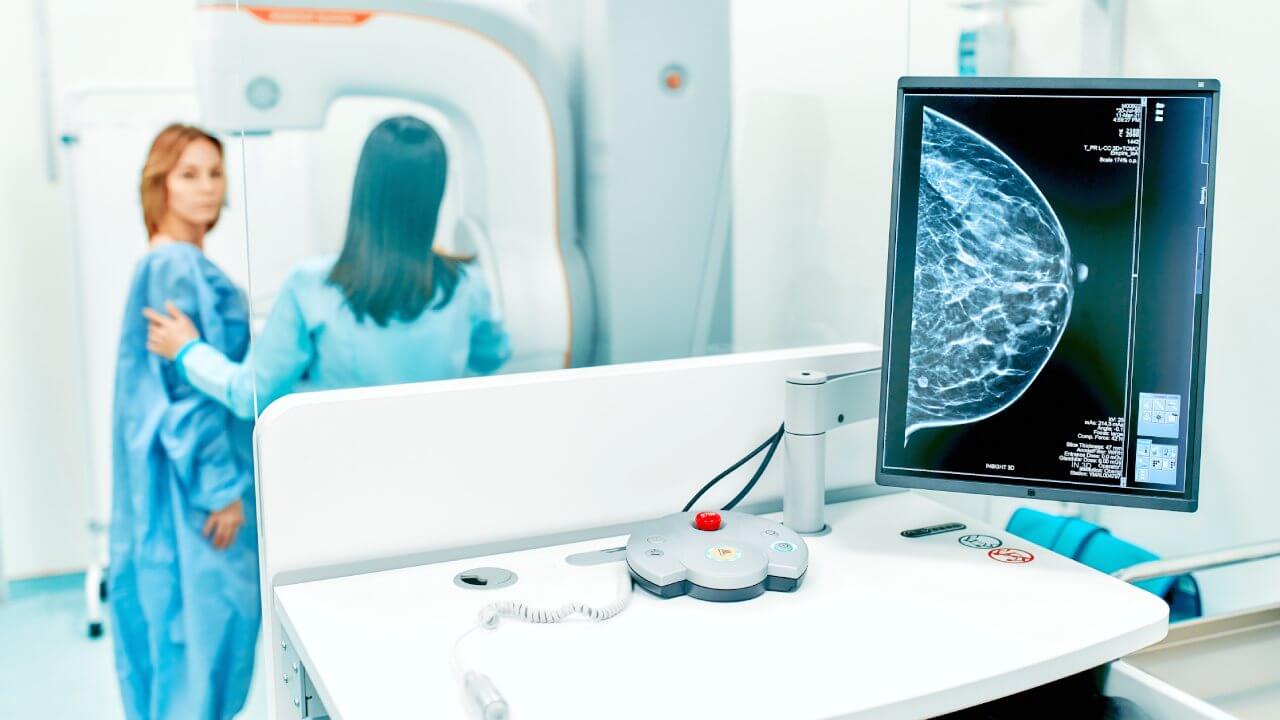
Confirming the Presence of Cancer Cells with Biopsy
Biopsy removes small tissue sample from a suspicious area. This confirms if mammary mass is benign or one of malignant mammary gland tumors – types include: fine needle aspiration (FNA), core needle biopsy, surgical (excisional) biopsy.
Biopsy is the only definitive way to know – it confirms whether lump contains breast cancer cells and analyzes specific biological markers that influence treatment strategy, prognosis, your entire care plan going forward.
Histopathology and Receptor Testing
After tissue is removed, it undergoes histopathological analysis during which pathologists aim to determine tumor type, grade, hormone receptor status, HER2 status (a protein that promotes cancer growth). These findings help oncologists select the most effective treatment and estimate the likely course of disease. E.g., ER-positive tumors respond to hormonal therapy, HER2-positive tumors – to targeted agents, triple-negative tumors require different approaches entirely. That is why receptor testing matters.
Staging the Disease
CT, PET, or bone scans are carried out after the diagnosis confirmation to determine tumor size and, the most important, whether disease has spread to lymph nodes or distant organs.
Stage 0-I represents localized, small mammary tumors; stage II-III indicates regional spread to lymph nodes or skin; stage IV means malignant tumors with distant metastases (lungs, liver, bones).
Correct staging is crucial – it dictates everything from surgical approach to adjuvant therapy selection, etc. Staging errors can lead to undertreatment or overtreatment, both of which affect survival and quality of life.
Breast Self-Examination
Breast self-examinations are among simplest ways to detect breast cancer early. Very effective practice – it helps women become familiar with their breast tissue (what's normal for you) so they can notice even subtle changes that could indicate problem.
According to the World Health Organization [1] and American Cancer Society [3, 4], women should begin self-exams in their early 20s. Risk of breast cancer increases with age, and self-monitoring significantly increases your chance of identifying signs at early stage when treatment is most effective and survival rates exceed 90%.
How and When to Perform a Self-Exam
Best time is 7-10 days after the start of menstruation, this is when breasts are least swollen or tender. Postmenopausal women should choose the same day each month for consistency.
How to examine your breasts:
Visual Inspection. First, stand with arms by your sides (in front of mirror), then raised overhead, then pressed firmly on hips. Look for changes in breast size, shape, or symmetry (in motion), nipple discharge or retraction, actually, anything that is not normal for you.
Palpation while lying down. Use pads of your three middle fingers (not fingertips) to feel entire breast area in circular motion. Apply light pressure first, then medium, then firm to feel different tissue depths – use same "route" each time: clockwise, up-and-down, or wedge-shaped patterns work equally well as long as you're consistent. Don't skip underarm area where lymph nodes can indicate early spread.
Palpation in the shower. Wet skin allows fingers to glide more easily – may make it easier to feel changes in breast tissue that you'd miss when skin is dry.
Any lump, swelling, skin change, or unusual sensation should be checked by doctor. Even if you just had normal mammogram. Self-exams catch things between screenings.
Self-Examination vs. Clinical Screening
Self-exams are helpful. They don't replace medical screening though. Clinical breast exams and mammography are more accurate – can detect cancer before physical signs appear, before tumors are large enough to feel. The Centers for Disease Control and Prevention [6] recommends mammograms every 1-2 years for women aged 40-74; the frequency of preventive examinations depends on individual risk factors like family history, genetic mutations (BRCA1/BRCA2), prior breast biopsies showing atypical hyperplasia.
Late Symptoms of Breast Cancer
Without treatment, breast cancer spreads to surrounding tissues and, after that, – to distant organs. That is when late-stage symptoms occur.
Systemic Symptoms and Tumor Progression
Mammary tumors often outpace their blood supply when growing. This leads to tissue breakdown, necrosis, chronic inflammation; thus, patients begin experiencing persistent pain in breast, chest wall, or underarm. A doctor can find unhealed wounds on the breast, ulceration or open sores, visible lumps or masses protruding from breast surface, discharge of pus or necrotic tissue from the nipple.
Skin over the tumor may become darkened, swollen, hot to touch. These signs reflect advanced local invasion of breast tissue – in many cases, tumor infiltrates surrounding structures (pectoral muscles, chest wall) which leads to restricted arm mobility and persistent pain. Inflammatory breast cancer can cause diffuse swelling, redness, thickening of entire breast without a distinct lump.
Distant Metastases and Organ Involvement
Bones, lungs, liver, and central nervous system (CNS) are the most common sites of metastasis – this is due to anatomical proximity. And once breast cancer spreads beyond the mammary gland, it becomes life-threatening; metastatic breast cancer is stage IV oncology in most cases. It is considered incurable, but not untreatable.
Comparing Breast Cancer Treatment Methods
Patients may find the variety of methods confusing. What is important, modern treatment of breast cancer is always individualized.
The table below compares the most commonly used methods to treat mammary cancer. The final treatment plan is elaborated by the tumor board.
| Treatment Method | Description | Approximate Cost (EUR) |
|---|---|---|
| Mastectomy | Complete removal of the affected breast; may include nearby lymph nodes | €10,900 – €18,200 |
| Radiation Therapy | External beam therapy to destroy residual cancer cells | €28,000 – €42,000 |
| Chemotherapy | Systemic drug therapy for localized or metastatic breast cancer | €80,000 – €150,000, full course |
| Hormone Therapy | Used in hormone receptor-positive cancers to block estrogen | €10,000 – €15,000 |
| Targeted Therapy | Drugs for HER2-positive mammary tumors | €375,000 – €420,000/course |
| Immunotherapy | Stimulates the immune system to fight advanced cancers | €375,000 – €420,000/course |
* Average figures so you can see what to count on; to see actual costs, visit the Booking Health website.
Where to Treat Breast Cancer in Germany
Germany offers access to advanced diagnostic tools and innovative, evidence-based therapies. It is internationally recognized country with high standards in breast cancer treatment. And here are some of the best hospitals – here patients receive professional care:
- University Hospital LMU Munich, Department of Gynecology and Obstetrics.
- Hannover Medical School (MHH), Department of Gynecology and Mammology.
- University Hospital Essen (Comprehensive Cancer Center).
- University Hospital RWTH Aachen, Department of Gynecology and Oncology.
- University Hospital Marburg (UKGM), Breast Cancer Center.
- University Hospital Jena, Department of Gynecology and Reproductive Medicine.
- University Hospital Halle (Saale), Department of Gynecology and Mammology.
- Dr. Ute Sendler Clinic, Gynecologic Oncology Unit.
- LDG Laboratories Dr. Gansauge, Berg.
Each institution has proven track record managing malignant tumors. Many women – from Middle East, Eastern Europe, and Asia – choose German centres for second opinions or primary treatment.
Fighting Breast Cancer Together: Treatment Journeys with Booking Health
A Medical Journey: Every Step of the Way With Booking Health
Finding the best strategy to treat breast cancer can be overwhelming. After undergoing numerous tests, consulting multiple specialists, and trying different therapies, patients often feel exhausted and unsure of the next step. In this situation, it is easy to settle for the first option offered or follow a standard treatment protocol – even if it comes with significant side effects and limited results.
To make an informed decision and get a personalized breast cancer treatment plan tailored to your specific case, consult the medical experts at Booking Health. For more than 12 years, Booking Health has been among the leaders of international healthcare, helping patients access innovative and effective treatments in Germany's top hospitals.
We offer:
- Comprehensive assessment and analysis of your medical records
- Development of an individualized care plan
- Selection of the most suitable hospital based on your clinical needs
- Preparation and forwarding of medical documentation
- Direct communication with leading breast cancer specialists
- Expert coordination during your hospital stay
- Post-treatment follow-up once you return home
- Full support with travel logistics, visa applications, and scheduling
- A dedicated medical coordinator and interpreter available 24/7
- Transparent pricing with no hidden fees
When your health is at stake, you deserve a partner with experience and compassion. Booking Health ensures that every step of your breast cancer diagnosis and treatment journey is safe, smooth, and fully supported.
Contact our medical advisor today to explore your personalized treatment options and take the first step toward a healthier future.
Frequently Asked Questions of Our Patients with Breast Cancer
Send request for treatmentPainless lump, changes in nipple shape or position, or unusual discharge may be early signs of breast cancer – or benign conditions, as well. Some women also notice dimpling of the skin, swelling, or redness.
As statistics shows, most breast lumps are cysts (i.e. fluid-filled sacs), non-cancerous mammary tumors (e.g., fibroadenomas) – or are brought about by hormonal changes. Any new lump should be evaluated by a healthcare professional – to exclude malignancy. Do not be afraid of check-up.
Breast cancer symptoms often develop without pain. Many women only experience discomfort in the later stages or if inflammation is involved – that is why early signs can be ignored and the visit to a doctor postponed.
Choose treatment abroad and you will be sure to get the best results!
Authors:
This article was edited by medical experts, board-certified doctors Dr. Nadezhda Ivanisova, and Dr. Bohdan Mykhalniuk. For the treatment of the conditions referred to in the article, you must consult a doctor; the information in the article is not intended for self-medication!
Our editorial policy, which details our commitment to accuracy and transparency, is available here. Click this link to review our policies.
Sources:
[1] World Health Organization. Global Cancer Burden Growing, Amidst Mounting Need for Services. https://www.who.int/news/item/01-02-2024-global-cancer-burden-growing--amidst-mounting-need-for-services
[2] The Lancet. The Lancet Breast Cancer Commission: Tackling a Global Health, Gender, and Equity Challenge. https://linkinghub.elsevier.com/retrieve/pii/S0140673622001842
[3] American Cancer Society. Survival Rates for Breast Cancer. https://www.cancer.org/cancer/types/breast-cancer/understanding-a-breast-cancer-diagnosis/breast-cancer-survival-rates.html
[4] American Cancer Society. Paget Disease of the Breast. https://www.cancer.org/cancer/types/breast-cancer/about/types-of-breast-cancer/paget-disease-of-the-nipple.html
[5] National Breast Cancer Foundation. Breast Cancer Stages. https://www.nationalbreastcancer.org/about-breast-cancer/breast-cancer-staging/
[6] Centers for Disease Control and Prevention. Screening for Breast Cancer. https://www.cdc.gov/breast-cancer/screening/index.html
Read:
Breast cancer treatment with dendritic cells in Germany
Comprehensive Guide to Stage 4 Breast Cancer: Treatment Options
Article menu:
- General Symptoms of Mammary Gland Cancer
- When It is Better to See a Doctor
- Diagnostic Steps After Symptoms Appear
- Breast Self-Examination
- Late Symptoms of Breast Cancer
- Comparing Breast Cancer Treatment Methods
- Where to Treat Breast Cancer in Germany
- A Medical Journey: Every Step of the Way With Booking Health
- Frequently Asked Questions of Our Patients with Breast Cancer
Don't know where to start?
Contact Booking Health

